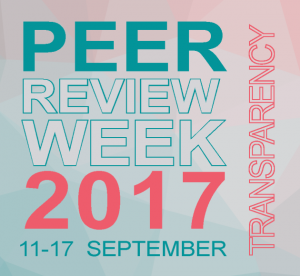A growing community of scientists from a variety of disciplines is moving the norms of scientific research toward open practices. Supporters of open science hope to increase the quality and efficiency of research by enabling the widespread sharing of datasets, research software source code, publications, and other processes and products of research.
Messaggi di Rogue Scholar

Last week marked peer review week, an event we’ve followed since the inaugural event in 2015 (which you can see from our previous blog). Like next months Open Access Week, this is a great opportunity to throw some light on what goes on “under the hood” in academic publishing, as well as encourage innovation and uptake of more open and transparent research practices.

*As a journal focussed on open science we are big promoters of research parasites (and research on parasites), and try to feeds them with open data and tools. It is therefore appropriate this is the second year GigaScience has supported and sponsored the Research Parasite awards.

We are pleased to welcome our Postdoctoral Fellow, Dr. Dan Sholler. Dan is an expert in qualitative research (yes, you read that correctly) and studies digital infrastructure creation, growth, and maintenance efforts. Through this research interest, he was drawn to the open science community and its ongoing development of tools and communities to support sustainable, reproducible, high-quality research.

Passiflora , commonly known as Passion Vines or Passion Flowers is a genus encompassing around 500 species, all of which exhibit such huge variation in leaf shape. To further understand the unique diversity of Passiflora leaves, a recent paper published in GigaScience , presents a morphometric analysis and unique open dataset encompassing over 3,300 leaves from 40 different Passiflora species.
Should you cite preprints in your papers and should journals allow this? This is a topic that gets debated periodically. The most recent round of Twitter debate started last week when Martin Hunt pointed out that the journal Nucleic Acids Research wouldn’t allow him to cite them. A couple of days later I suggested that journals that don’t allow citing preprints are putting their authors’ at risk by forcing them not to cite relevant work.
The Weecology lab group run by Ethan White and Morgan Ernest at the University of Florida is seeking a Data Analyst to work collaboratively with faculty, graduate students, and postdocs to understand and model ecological systems. We’re looking for someone who enjoys tidying, managing, manipulating, visualizing, and analyzing data to help support scientific discovery.

Authors can now submit their bioRxiv preprints directly to GigaScience via the biorXiv platform, at the push of a button. This handy technical integration is another hallmark of biology preprints becoming a normal, accepted, and speedy way of communicating research results. Pre-prints, versions of a scholarly paper that precede formal publication in a peer-reviewed journal are becoming increasingly mainstream.
We are very exited to announce a major new release of the Data Retriever, our software for making it quick and easy to get clean, ready to analyze, versions of publicly available data. The Data Retriever, automates the downloading, cleaning, and installing of ecological and environmental data into your choice of databases and flat file formats.
For the last few years, we have been working on the development of new Drosophila flight simulators. Now, finally, we are reaching a stage where we are starting to think about how to store the data we’ll be capturing both with Open Science in mind, but particularly keeping in mind that this will likely be the final major overhaul of this kind of data until I retire in 20 years.